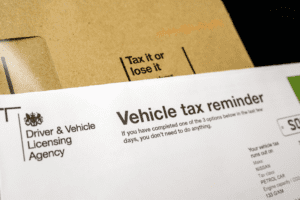Buying a new car can be a very exciting time, but it is a big purchase. You may be wondering what your legal rights are if something should go wrong when buying a car. There are a few ways in which you are protected when buying a car. From the Consumer Rights Act 2025 to the Consumer Protection from Unfair Trading Regulations 2008, you could have the right to reject a vehicle if it’s not fit for purpose, as described or if you’ve been the victim of aggressive sales tactics. Find out more about your rights when buying a car.
The Consumer Rights Act 2015.
The Consumer Credit Act 2015 is a government legislation which protects car buyers and allows them to apply for a full refund if the car they have bought is not:
- Of satisfactory quality – Must not be faulty or broken and of a reasonable standard expected of its age and mileage.
- Fit for purpose – Meets the needs of the driver and any specific purpose you’ve told the dealer the car you be used for before buying.
- As described – Matches the description (written, verbal or visual) provided by the seller.
You could also be entitled to repair work, a replacement or refund if the car develops a fault.
NOTE: The Consumer Credit Act only covers you when buying from a car dealer and not private sellers.
Get a full refund.
The CCA allows you to apply for a full refund of a car within the first 30 days from the date you bought the car. If the car is not fit for purpose, of satisfactory quality, develops a serious fault or is as described, you’re entitled to hand the car back and have your money refunded. Dealers do have the right to dispute your rejection, and if you want a refund, you may need to start court proceedings.
Request a repair or replacement.
If you find a problem with your car after 30 days of purchase, you’ll not be entitled to a full refund. Instead, you can request a repair or replacement of the car. The dealership has one opportunity to repair or replace. If the dealer chooses to fix the car and it does not work, you may be entitled to a refund. Use of the car will be taken into account so you may not receive a full refund and the amount will be adjusted accordingly. Some dealers can also argue or prove the fault was present when you bought the car and you would be at fault if you did not report it.
Start a claim.
The longer you leave a fault on your car, the less rights you have. If you’ve found fault with your car after 6 months of ownership, it’s up to you to prove the fault was there at the time of delivery. If you feel you are able to prove the fault was present, you can then start a claim with the Motor Ombudsman to pursue a repair or replacement.
Consumer Protection from Unfair Trading Regulations 2008.
The Consumer Protection from Unfair Trading Regulations is another government legislation which helps to protect car buyers. All car dealers must comply and avoid unfair business practices such as:
- Giving false information – either verbally, visually or in writing, for example misrepresenting the vehicle’s specification or history at any time before, during or after the transaction.
- Giving insufficient information – leaving out or hiding important information for example not disclosing the existence and results of all checks carried out on the vehicle’s mechanical condition, history and mileage or failing to draw your attention to the key elements of any warranty, eg what’s covered, claim limits and conditions to be followed.
- Acting aggressively for example using high pressure selling techniques to sell a vehicle or associated finance or warranty.
- Failing to act in accordance with reasonable expectations of what’s acceptable.
- 31 specific practices are banned outright including: falsely claiming to be a signatory to a Code of Practice; falsely claiming to be approved, endorsed or authorised by a public or private body; falsely stating that a vehicle will only be available for a very limited time in order to elicit an immediate decision to buy.
Key contacts & advice.
If you need advice or guidance on making a claim, requesting a refund from a dealership or rejecting a car, you can find out more information from the following:
Citizens Advice.
Citizens Advice is a national charity providing confidential and impartial advice. They have online help guides which advise what to do when you have a problem with a car repair or refund.
📞 Citizens Advice Helpline: 0808 223 1133.
The Motor Ombudsman.
The Motor Ombudsman is an automotive resolution body who helps UK drivers dispute conflicts within the automotive industry. They can provide impartial advice and work on your behalf to resolve claims.
📞 Motor Ombudsman: 0345 241 3008 (option 1).
How to protect yourself:
In some cases, the need for a refund, repair, or replacement can be unavoidable but you can help to protect yourself by following these top tips below.
- Choose an established dealership with good reviews, and reputation and is part of a trade association such as the Retail Motor Industry Federation or verified by the Financial Conduct Authority.
- Get FREE vehicle information from the DVLA to ensure the cars information matches the sellers description.
- Take a 30 minute test drive and inspect the vehicle.
- Check the age and mileage of the vehicle.
- Ensure the seller has the V5C log book and the information matches the vehicle.
Find out more with our buying a used car checklist!
Related Articles:

Should I buy a new or used car next?
We look at both brand-new cars and used cars in more detail to help you determine which is best for your budget and your personal circumstances.

How much is car tax?
The amount you pay for road tax can depend on the type of car you drive and rates can range from as little as £0 up to £2,000 in the first year!

How to check if a car has existing finance?
Protect yourself when buying a car by checking if it already has existing finance against it, especially if you’re using a private seller.